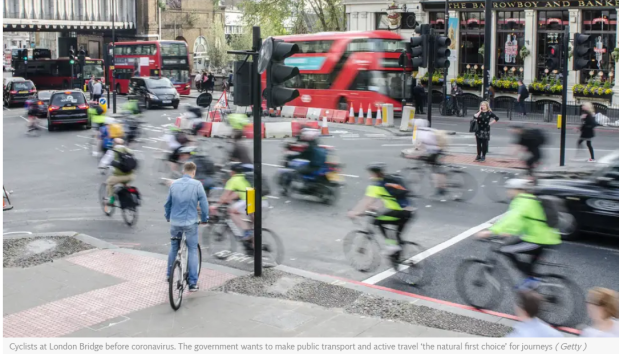Climate crisis: UK Government unveils ‘unprecedented’ vision of future travel with focus on walking, cycling and public transport, targeting ‘net zero’ greenhouse gas emissions by 2050
UK MINISTERIAL FOREWORD
Secretary of State for Sustainable Transport
Climate change is the most pressing environmental challenge of our time. There is overwhelming scientific evidence that we need to take action, and doing so is a clear priority for the Government.
That is why in June 2019 we became the first major global economy to pass a law that requires us to achieve ‘net zero’ greenhouse gas (GHG) emissions by 2050. Transport has a huge role to play in the economy reaching net zero. The scale of the challenge demands a step change in both the breadth and scale of ambition and we have a duty to act quickly and decisively to reduce emissions.
The associated benefits of bold and ambitious action to tackle transport emissions are also significant. We can improve people’s health, create better places to live and travel in, and drive clean economic growth. The UK is a global centre for world leading science, technology, business and innovation and we are perfectly placed to seize the economic opportunities that being in the vanguard of this change presents. The faster we act, the greater the benefits.
Through the Transport Decarbonisation Plan, 2020 will be the year we set out the policies and plans needed to tackle transport emissions.
This document marks the start of this process. It gives a clear view of where we are today and the size of emissions reduction we need. A series of events, workshops and opportunities this year will ensure you have a chance to have your say on how we do this. We want to hear from individuals, businesses, trade associations, local authorities, scientists, researchers, innovators, interest groups and environmental groups as we develop the first comprehensive action plan for decarbonising transport.
In the coming months we will work with you to develop the plan, with a vision for how a net zero transport system will benefit us all:
• Public transport and active travel will be the natural first choice for our daily activities. We will use our cars less and be able to rely on a convenient, cost-effective and coherent public transport network.
• From motorcycles to HGVs, all road vehicles will be zero emission. Technological advances, including new modes of transport and mobility innovation, will change the way vehicles are used.
• Our goods will be delivered through an integrated, efficient and sustainable delivery system.
• Clean, place-based solutions will meet the needs of local people. Changes and leadership at a local level will make an important contribution to reducing national GHG emissions.
• The UK will be an internationally recognised leader in environmentally sustainable, low carbon technology and innovation in transport.
• We will lead the development of sustainable biofuels, hybrid and electric aircraft to lessen and remove the impact of aviation on the environment and by 2050, zero emission ships will be commonplace globally.
We will also look to develop a universally recognised measure so that in future, people can easily compare how much CO2 different forms of transport emit over a certain distance.
Success will require the sector, and its users, to embrace new technology and innovation like never before. We believe the transport sector is ready to step up and meet those challenges.
As we move towards a net zero GHG emissions transport system, we cannot lose sight of the fact that the UK is on a journey with the rest of the world. Action is needed beyond the UK, and we are in a unique position to demonstrate real leadership domestically, as well as leading change in sectors that require global solutions, such as international shipping and aviation.
This document marks the beginning of a conversation to develop the policies needed to decarbonise transport. As we prepare to host the UN’s annual climate change conference COP26 in Glasgow this November, we will publish our Transport Decarbonisation Plan which will set out how we intend to transform the movement of people, goods and services to reach net zero.
# # #
- Ministerial Foreword
- About this document
- At a glance
- Structure of this document
- How to engage with us
1. Greenhouse gas emissions and transport
2. Moving people: emissions by mode
3. Delivering goods and services: emissions by mode
4. The Current Trajectory
The text may be freely downloaded and translated by individuals or organisations for conversion into other accessible formats. If you have other needs in this regard please contact
Cover picture: Transdev Blazefield Ltd.
# # #
About the editor:
Eric Britton
13, rue Pasteur. Courbevoie 92400 France
Bio: Founding editor of World Streets (1988), Eric Britton is an American political scientist, teacher, occasional consultant, and sustainability activist who has observed, learned, taught and worked on missions and advisory assignments on all continents. In the autumn of 2019, he committed his remaining life work to the challenges of aggressively countering climate change and specifically greenhouse gas emissions emanating from the mobility sector. He is not worried about running out of work. Further background and updates: @ericbritton | http://bit.ly/2Ti8LsX | #fekbritton | https://twitter.com/ericbritton | and | https://www.linkedin.com/in/ericbritton/ Contact: climate@newmobility.org) | +336 508 80787 (Also WhatApp) | Skype: newmobility.)
View complete profile


Thank you Eric for signaling the move.
Too sad they restrict their considered modes to solutions unlikely to significantly reduce CO2 emissions. Maybe should they be told about CarLina in some way?
I recently completed a study on the operating cost, and despite the very low deployment cost and services far beyond what is available today, like 24/7 + goods/parcels, it stands around 0.15€ per km.passenger.
Best Regards,
Paul